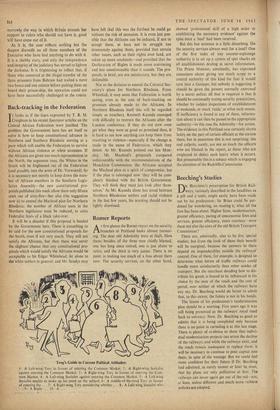Back-tracking in the Federation
IT looks as if the fears expressed by T. R. M. Creighton in his recent Spectator articles on the Central African Federation were justified. The problem the Government here has set itself to solve is how to keep constitutional advance in Northern and Southern Rhodesia moving at a pace which will enable the Federation to survive without African violence or white secession. If the Africans are given too much representation in the North, the argument runs, the Whites in the South will be frightened out of the Federation (and possibly into the arms of Dr. Verwoerd). So it is necessary not merely to keep down the num- ber of African members in the Southern Legis- lative Assembly—the new constitutional pro- posals published this week allow them only fifteen seats out of sixty-five—but also (the suggestion now is) to amend the Macleod plan for Northern Rhodesia; the number of African seats in the Northern legislature must be reduced, to calm Federalist fears of a black take-over.
It will be a disaster if this proposal is heeded by the Government here, There is something to be said for the new constitutional proposals for the South, even if not very much. They will not satisfy the Africans, but then there was never the slightest' chance that any constitutional pro- posals which would satisfy the Africans would be acceptable to Sir Edgar Whitehead, let alone to the white settlers in general; and Mr. Sandys may 1: A Left-wing against entering mon .Market. 4: Socialist unable of entering the .
, 9: A Right-
Trog's Guide to Current Political Attitudes:
Tory in favour of entering the Common Market. 2: A Right-wing Socialist the Common Market. 3: A Right-wing Tory in favour of entering the Com- A Left-wing Socialist against entering the Common Market. 5: A Left-wing to make up his mind op the subject. 6: .A middle-of-the-road Tory in favour .. 7: A Right-wing Tory considering whether ... 8: A Left-wing Socialist %silo
10: A...
have felt the this was the furthest he could go without the risk of secession. It is even just pos- sible that the Africans can be induced, if not to accept them, at least not to struggle too strenuously against them; provided that certain other issues, such as their rights over land, are taken up more resolutely—and provided that the Declaration of Rights is made more convincing and less unenforceable than it sounds. The pro- posals, in brief, are not satisfactory, but they are defensible.
Not so the decision to amend the Colonial Sec- retary's plans for Northern Rhodesia. From Whitehall, it may seem that Federation is worth saving, even at the cost of back-tracking on promises already made to the Africans. In Northern Rhodesia itself this will be regarded simply as treachery. Kenneth Kaunda managed with difficulty to restrain the Africans after the London 'conference; if they do not now even get what they were as good as promised then, it is hard to see how anything can keep them from resorting to violence—especially if the change is made in the name of Federation, which they detest. As Mr. Kaunda pointed out last Mon- day, Mr. Macleod's proposals compared unfavourably with the recommendations of the Monckton Commission; the Africans accepted the Macleod plan in a spirit of compromise, but if the plan is sabotaged now 'they will be com- pletely finished with the British Government. They will think they must just look after them- selves.' As Mr. Kaunda alone has stood between Northern Rhodesian settlers and racial violence in the last few years, his warning should not be lightly d ismissed.










































 Previous page
Previous page